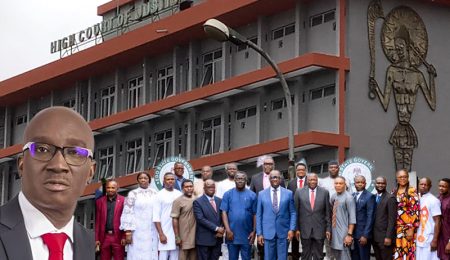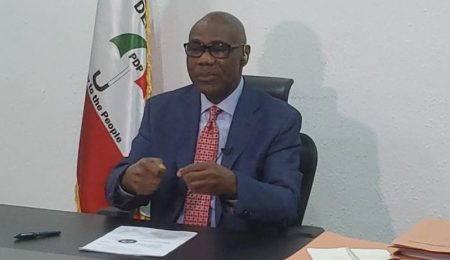Zamfara’s Commissioner for Budget and Planning Abdulmalik Abubakar Gajam, has asserted that his administration inherited a backlog in gratuity from the previous administration.
In an exclusive interview with ARISE NEWS on Thursday, Gajam accused the previous administration of misappropriation of funds while discussing pressing issues of banditry, public fund misappropriation, and the state’s ambitious plans for education and economic development.
“When we came on board, we inherited a government from the present state defence minister (Matawalle). In those four years, they have received a fat allocation of N290 billion, local government allocation of N133 billion and then collected a loan of N105 billion but we inherited a government that there was backlog in gratuity.”
Still reflecting on the previous administration’s performance, Gajam asserted, “I believe we haven’t gotten it right, I believe we have been sentimental and I believe the leadership of that state before now took government for granted. I think governance has to be a very serious business. That is the reason for the declaration of the state of emergency by his excellency Dr. Dauda Lawal on the area of education, gave us the room to start reconstruction and rehabilitation of over 300 primary schools.”
The Commissioner emphasized the urgent need for educational reform, noting, “On education, we have designated primary schools, designated secondary schools and then the tertiary institutions, their infrastructure is completely almost to nothing and then we talk about primary health care, with this insecurity crisis in most of this villages, there are no functioning primary healthcare system.”
He also addressed the dire consequences of the ongoing insecurity crisis, which has left many rural communities without functioning healthcare systems. Gajam explained, “The insecurity crisis that started, this thing started with just 50 people going around, rustling cows and then having maybe three to four AK47 in their hands but unfortunately we have seen the growth of that, we have seen them occupying places, even controlling some parts of the state.”
On the implementation of the new minimum wage of 70,000 naira in the state, Gajam assured that implementation would begin as the government integrates employee records. He asserted “The moment these committees finish up clearing and making sure they have this list of individuals that are legitimate.” However, he cautioned against expecting the wage increase to resolve all economic issues “When you talk about food items rising and then giving minimum wage will solve that problem, eventually there will be an issue with that because you have to create productivity for sustainability.”
The Commissioner also discussed the state government’s response to recent flooding in Gumi local government. He noted that assessments were underway to support affected residents, “The major flood we had was in Gumi local government so his excellency sent the entire team that has to do with the Zamfara geographical assessment agency and the ministry of housing and urban development to access the houses that were dismantled and I know there was a committee sent to identify a land, building will start very soon and there were palliatives given to people of Zurmi and Anka local government.”
Gajam explained the government’s decision to invest 62 billion naira in constructing an airport rather than investing in social development. He identified key sectors such as mining and agriculture as vital for economic growth. “The biggest potentials we have in Zamfara state is the mineral sector and agricultural sector. Unless you invest in your state and open it wide open, there is no any serious investor that is willing to transport themselves from Abuja to Zamfara eight hours, to come and invest in these critical sectors.”
He opined the necessity of opening investment opportunities to create jobs: “For you to create jobs, you have to open up investment opportunities and without airport, it is now very critical.” He expressed hope that these investments would yield significant returns in the coming years: “As painful as it is for us to spend this amount of money that will yield result by a people that have hope and faith in making sure that in the next few 2, 3 years, Zamfara state will completely be independent in the terms of revenue generation.”
Expressing optimism about future developments, Gajam stated, “This airport will open doors for international direct investment especially in the mining sector; we are going to unveil by the end of the year the intention of the state to create an international market.”
Faridah Abdulkadiri
Follow us on:


